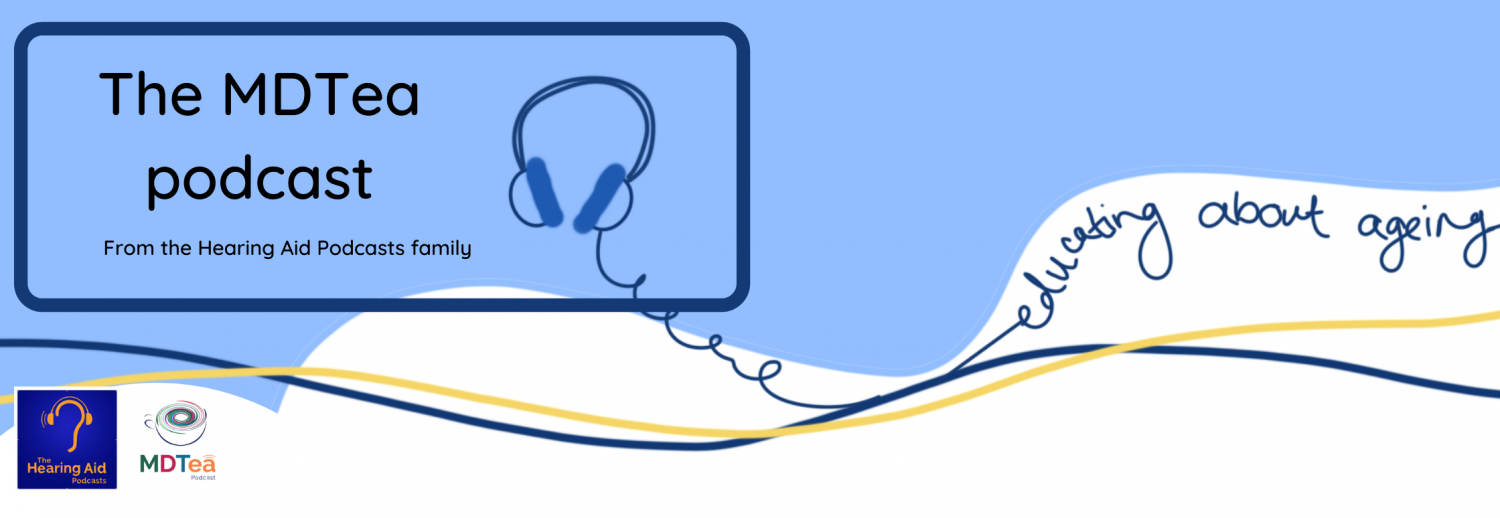12.9 Community Pharmacy
Presented by: Iain Wilkinson, Jo Preston and Stephen Collins
Special Guest: James Prewett
Broadcast date: 15th November 2022

The MDTea Podcast is supported by the British Geriatric Society
Learning Outcomes
Knowledge:
- To learn about the specific role played by community pharmacy teams in managing medications, prescribing and deprescribing, providing safe means of administering medications to older adults, managing minor acute illnesses and offering patient consultations relating to health and lifestyle.
Skills:
- To appreciate the skillset owned by those working in community pharmacy, and how much more they do than just handing out medications.
- To see the thought processes that go into all the decision-making in community pharmacy, to ensure that patients are safely managed away from a hospital setting as much as is possible.
Attitudes:
- To learn about some of the wider team in community pharmacy who support the pharmacists in their work and ensure holistic care is provided for patients.
- To discover for ourselves what goes on behind the doors of our local pharmacies, and how they can often be one of the first teams that Jean goes to when she has difficulties or healthcare needs, and the people involved in her care who she might meet most often and know most closely.
Rawle et al, Associations Between Polypharmacy and Cognitive and Physical Capability: A British Birth Cohort Study, Journal of the American Geriatrics Society (2018) – https://agsjournals.onlinelibrary.wiley.com/doi/full/10.1111/jgs.15317
Some facts about community pharmacy
- In England alone, about 1.6 million people visit a community pharmacy every day (https://psnc.org.uk/pharmacy-the-heart-of-our-community/about-community-pharmacy/)
Community pharmacy, sometimes called retail pharmacy, is one of the four pillars of the UK’s primary care system, along with general practice, optical services and dentistry. It is most well-known as a dispenser of medicines, but its role is much broader and includes other NHS and publicly funded services. (https://www.kingsfund.org.uk/publications/community-pharmacy-explained)
Community pharmacists are taking on more clinical roles that have traditionally been undertaken by doctors, such as managing and monitoring long term conditions, eg asthma and diabetes, as well as delivering vaccinations and conducting medicines reviews. They also provide smoking cessation services and advise on dietary issues and sexual health matters.
Some community pharmacists own their own businesses and enjoy managing and having responsibility for their staff, stock and premises. Others work for large pharmacy chains and have the opportunity to move around and progress to more senior roles within an established company structure. (https://www.rpharms.com/resources/careers-information/career-options-in-pharmacy/community-pharmacy-careers)

How might community pharmacy help Jean?
Jean’s family notice that she’s making some mistakes with her medications, and not always taking her critical meds for Parkinson’s disease.
Her family are struggling to manage Jean’s medications, and as a result carers are now becoming more involved with helping give Jean’s meds.
It may now be appropriate for community pharmacy to look at deprescribing for Jean, with her becoming much more frail. She needs her PD meds, but perhaps a few others could stop (eg statins, PPI’s).
Other questions for the community pharmacy team to consider include…
– What meds does Jean pick up every month?
– How long has she needed a blister pack? Why was this introduced?
– Who exactly is giving the meds? Can Jean take them alone anymore?
– How often are her long-term meds reviewed normally?
– Have other community pharmacists made changes to her meds before?
– How could community pharmacy now help improve Jean’s quality of life?
Social Media this week...
Iain: Twitter thread from Ben Meer about the ‘7 types of rest’ which people need to avoid burnout, including physical rest, mental rest, social rest, spiritual rest, sensory rest, emotional rest and creative rest.
How to avoid burnout.
— Ben Meer (@SystemSunday) August 31, 2022
Get 7 types of rest:
Curriculum Mapping
NHS Key Skills Framework
Core
Develop and maintain communication with people on complex matters, issues and ideas and/or in complex situations
Foundation Curriculum (Year One and Year Two)
2.6 Communicates clearly in a variety of settings
Works effectively within the healthcare team for the benefit of patient care
2.7 Works effectively as a team member
Acts as a member of the multidisciplinary professional team by supporting, respecting and being receptive to the views of other healthcare professionals
3.10 Recognises, assesses and manages patients with long-term conditions
Formulates individual patient management plan based on assessment of frailty as well as clinical need
GP Training Curriculum
Making decisions
Recognise the importance of a problem-based approach, taking in the ‘big picture’, rather than a disease-based approach to the care of older people, who often have complex physical, psychological and social problems
Managing medical complexity
Understand how co-morbidity will influence the management of existing disease and delay the early recognition of adverse clinical patterns
Core Medical Trainee
- Common competencies:
Managing patient conditions and promoting patient self-care
Outline the concept of quality of life and how it can be measured
Geriatric medicine competencies:
Understand the factors which influence health – psychological, biological, social, cultural and economic especially work and poverty
Internal Medicine Training Curriculum
Generic CiP3:
Communicates effectively and is able to share decision making, while maintaining appropriate situational awareness, professional behaviour and professional judgement
Geriatrics and Higher Specialty Training Curriculum
Rehabilitation and Multidisciplinary Team Working
Roles and expertise of different members of interdisciplinary team

